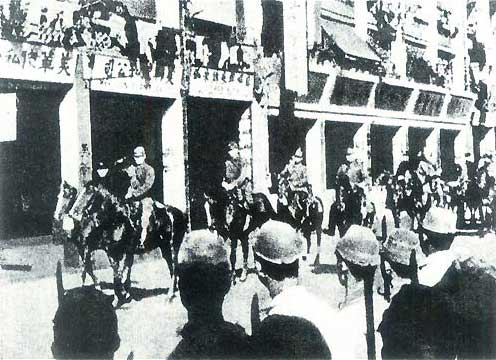
Lt. Gen. Takashi Sakai, leading the column of soldiers, who commanded Imperial Japanese Army troops that captured Hong Kong, was executed in Nanking, China, on September 13, 1946
By Phil Kohn. Dedicated to the memory of his father, GM3 Walter Kohn, U.S. Navy Armed Guard, USNR, and all men and women who have answered the country’s call in time of need. Phil can be contacted at ww2remembered@yahoo.com.
Lt. Gen. Takashi Sakai, who commanded Imperial Japanese Army troops that captured Hong Kong, is executed in Nanking, China, on September 13, 1946. Extradited from Japan to China by U.S. occupation authorities, Sakai was tried and found guilty of command responsibility for the extrajudicial murder of Chinese civilians. At Kraków, Poland, former SS-Hauptsturmführer Amon Göth, Austrian commandant of the Kraków-Płaszów concentration camp — where between 8,000 and 12,000 inmates were murdered — is executed by hanging. Tried by the Supreme National Tribunal of Poland, Göth was convicted of membership in the Nazi Party, ordering the imprisonment, torture and execution of individuals and groups of people, and homicide “for personally killing, maiming and torturing a significant, albeit unknown, number of people.” (Göth, portrayed by actor Ralph Fiennes, was a central character in the 1993 film Schindler’s List.) The Soviet government issues a decree initiating “Operation Osoaviakhim” to relocate over 2,200 German rocket-production scientists (over 6,000 people in all, including family members) and facilities from the Soviet Occupied Zone of Germany to the U.S.S.R.
On September 14, the British government orders gas and electricity cut off in all buildings throughout the country that are occupied by squatters. Before leaving the Fontainebleau conference outside of Paris, Hồ Chi Minh, representing Vietnam, is forced to sign unfavorable accords with the French government. Hồ had visited the U.S. embassy in the French capital several times seeking assistance but was unsuccessful.
Vasil Petrov Kolarov on September 15 takes office as the first Provisional President of the Republic of Bulgaria, following abolition of the monarchy.
In the U.S.S.R., a drought and a poor harvest add to an ongoing famine. The government on September 16 issues a decree that doubles the price of meat and dairy products and triples the price of bread.
In the U.S., mass production of television sets starts on September 17. RCA begins making sets with 10-inch screens at its facility in Camden, New Jersey. Squatters begin to evacuate apartment houses and hotels in London that they had settled in, in the face of an eviction order from the courts, plus the shutting off of gas and electricity.
Archbishop Aloysius Stepinac of Zagreb, Croatia, is arrested by Yugoslav authorities on September 18. He is charged with treason and collaboration with the pro-Nazi, fascist Ustaše regime.
In a speech at Zurich, Switzerland, on September 19, former British prime minister Winston Churchill proposes an idea that will ultimately result in the European Community: “ . . .We must build a kind of United States of Europe. . . . If Europe were once united in the sharing of its common inheritance there would be no limit to the happiness, prosperity, and glory of which its 300 or 400 million people would enjoy.” In Washington, D.C., six civil-rights activists meet with President Truman to ask the federal government for help in ending violence towards African Americans, referencing several recent lynchings. Horrified by the details, Truman directs U.S. Attorney General Tom Clark to develop a “policy to prevent such happenings.”
The British government on September 20, 1946, announces a program to house 20,000 homeless people in empty military facilities. In Washington, D.C., President Truman requests the resignation of Secretary of Commerce Henry A. Wallace, due to Wallace’s comments about Soviet-U.S. relations on September 12. Truman says: “The government of the United States must stand as a unit in its relations with the rest of the world.” On the French Riviera, the first Cannes Film Festival opens.
In a war of a different sort, Vincent “The Don” Benevento, a wealthy manufacturer of Italian cheeses, dies on September 21 after being shot seven times by gunmen who burst into a cabin occupied by him and his wife at a resort in Lake Zurich, Illinois, a Chicago suburb. Benevento, the self-styled “Cheese King” — a long-time rival of Tony Accardo, who heads the “Chicago Outfit” founded by Al Capone — has been engaged in a struggle for control of the Italian-cheese market in the Windy City. In 1945, Benevento had amazingly survived a previous attack at his cheese factory, in which he had been shot 10 times but couldn’t identify the shooters. Police suspect the gunmen were the same in both instances.
The Iranian government reports on September 22 that a rebellion has begun in Fars Province in the country’s southwest. The rebels demand autonomy similar to that granted to Iran’s Azerbaijan Province. Three days of protests against the war in Indonesia begin in Amsterdam, the Netherlands. A ship carrying 600 Jewish refugees is stopped and boarded by British forces off Palestine. In a scuffle that ensues, one Jew is killed, and some are injured. The ship is taken to Cyprus and the passengers are placed into internment camps.
In accordance with a plebiscite held on September 15, the Assembly of the Faroe Islands votes 12-11 on September 23 to create a nation independent of Denmark. The Scandinavian nation has ruled the islands — in the North Atlantic, roughly midway between Iceland and Norway — since 1816. In Yugoslavia, Archbishop Aloysius Stepinac of Zagreb is indicted for aiding the Ustaše and the Axis puppet state of Croatia.
In Copenhagen, King Christian X of Denmark on September 24 dissolves the Assembly of the Faroe Islands and negates the body’s independence vote of the previous day.
Bushehr, Iran, a port on the Persian Gulf, falls to rebels from Fars Province on September 25.
On September 26, in Rangoon, Aung San agrees to become part of an interim government that will guide Burma to independence. Long a leader in efforts to overthrow British colonial rule over Burma, he had allied with the Japanese for years prior to switching sides at the very end of the war. British governor Maj. Gen. Sir Hubert Rance is chairman of the Executive Council, with Aung San as the deputy chairman.
The U.S., the U.K. and France on September 27, 1946, establish the Tripartite Commission for the Restitution of Monetary Gold, to be headquartered in Brussels, Belgium. The Commission’s mission is to recover gold looted by the Nazis from other countries and return it to the rightful owners. (After recovering all the gold it could, and receiving claims from 10 nations, the Commission found it did not have enough resources to pay each claim in full. As a result, each claimant received approximately 65% of their claimed losses. Its work completed, the Commission was formally dissolved in September 1998.)
King Georgios II of Greece returns to Athens on September 28 from his four-year absence, spent first in Egypt and then in Great Britain. At a press conference in Frankfurt am Main, Germany, U.S. General of the Army Dwight D. Eisenhower says that nuclear weapons should be made illegal. “I believe the outlawing of the atom bomb is the outlawing of wars . . . I think the time has come when humanity is intelligent enough to do away with war.”
The French Constituent Assembly on September 29 passes a new constitution for the Fourth Republic. In the U.S., the St. Louis Cardinals and the Brooklyn Dodgers both lose their final scheduled game of the season in the National League. The teams finish with identical 96-58 records and force the first tiebreaker playoff in Major League Baseball history. (The Cardinals sweep the first two games of the three-game series.)
On September 30, the International Military Tribunal in Nuremberg, Germany, returns verdicts for 22 top Nazi leaders being tried for war crimes. This includes Nazi party secretary Martin Bormann, who has been tried in absentia, neither he nor his body having been found. (Bormann’s remains are ultimately discovered in Berlin in 1972. With his time of death determined to have been May 1945, Bormann is believed to have been killed while fleeing from the Führerbunker and trying to leave the city.) Three of the accused — Hans Fritzsche, head of the news division of the Nazi Propaganda Ministry, Franz von Papen, ambassador to Austria and Turkey and former vice-chancellor of Germany, and banker and economist Hjalmar Schacht — are acquitted. Individual sentencing of those found guilty will take place tomorrow. (Originally, 24 top Nazi leaders were indicted, but two were not tried. One, Gustav Krupp, chief executive officer of Friedrich Krupp AG, an industrial conglomerate that produced munitions, was erroneously included instead of his son, Alfred. Gustav had been paralyzed since 1941 and his son ran the company for him for most of the war. The other, Robert Ley, head of the German Labor Front, committed suicide before the trials began and was neither found guilty nor acquitted, as his trial never went forward.)
On October 1, 19 of the 22 high Nazi officials accused in the Nuremberg War Crimes trials having been found guilty — of conspiracy to wage aggressive war, crimes against peace, crimes violating the laws of war, and crimes against humanity — are sentenced. Condemned to death are: Luftwaffe commander Hermann Göring; foreign minister Joachim von Ribbentrop; SS member and Gestapo chief Ernst Kaltenbrunner; head of the Wehrmacht High Command Field Marshal Wilhelm Keitel; minister for occupied territories Alfred Rosenberg; governor of Occupied Poland Hans Frank; Protector for Bohemia and Moravia Wilhelm Frick; publisher of the anti-Semitic newspaper Der Stürmer Julius Streicher; forced-labor chief Fritz Sauckel; head of the Wehrmacht General Staff Col. Gen. Alfred Jodl; Reichskommissar of the Occupied Netherlands Arthur Seyss-Inquart; and (in absentia) Nazi Party secretary Martin Bormann. Sentenced to life imprisonment are: Deputy Führer Rudolf Hess; Reichsbank director Walther Funk; and Kriegsmarine commander Grand Adm. Erich Raeder. In addition, Gauleiter of Vienna Baldur von Schirach is sentenced to 20 years; minister of armaments Albert Speer receives 20 years; former foreign minister and Protector for Czechoslovakia Constantin von Neurath receives 15 years; and Grand Adm. Karl Dönitz receives 10 years. In North America, the Eleventh U.S. Army Air Force becomes the Alaskan Air Command and moves its headquarters from Adak Island in the Aleutians to Elmendorf Field in Anchorage, Alaska.
Faraway Hill, the very first “soap opera” broadcast on U.S. network television, premieres on the DuMont network on October 2. The 30-minute program, budgeted at $300 per episode, airs for 12 weeks. Broadcast live, the program has no commercials — and makes no money.
All 39 people aboard an American Overseas Airlines flight from New York to Berlin, with stops in between, are killed when their Douglas DC-4 slams into the side of a hill ten minutes after taking off from Stephenville, Newfoundland, Canada, on October 3. It is the worst civilian air crash to date.







